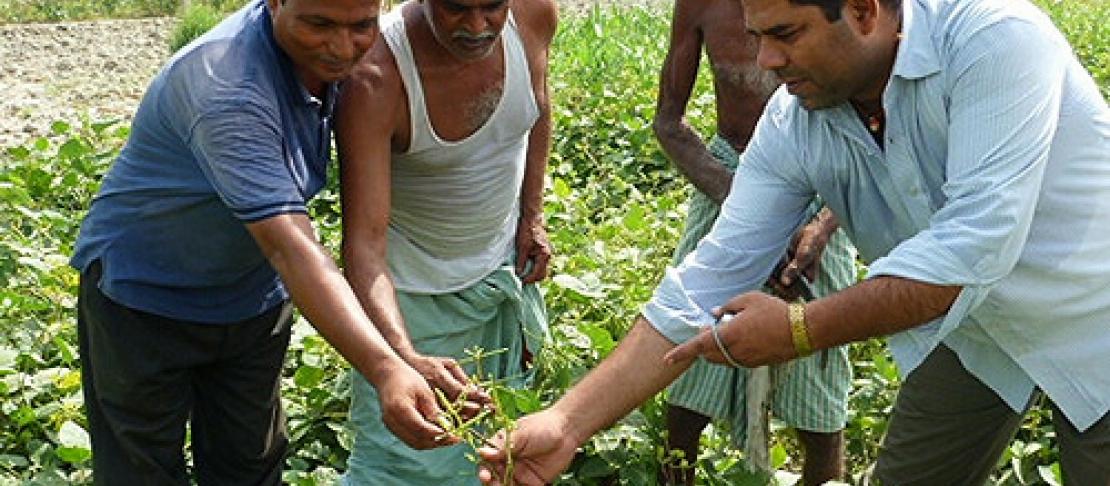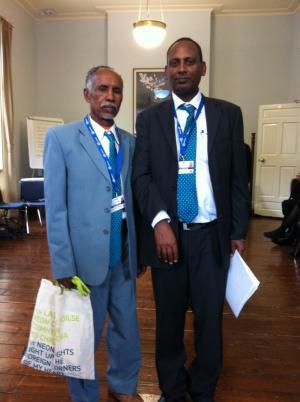Innovation matchmaking links climate innovators

by Shauna Monkman
Sharing knowledge and best practices across different levels of an agricultural system promotes health and resilience. The art, however, is not in connecting different people, but in finding ways to facilitate discussions so that voices can be heard and understood outside of individual comfort zones.
A Hunger, Nutrition and Climate Justice Dialogue in Dublin last week answered this challenge by aiming to improve food security through cross system dialogues. The conference brought farmers, policy makers, civil servants, scientists and select business leaders together to share knowledge and to highlight examples of how science and policy makers are successfully working with local populations - especially farmers.
The goal was to use dialogue to improve linkages between the issues of hunger, nutrition and climate justice at all levels of the food system.
In some ways, last week’s conference was akin to a massive matchmaking exercise. It recognized the need to better connect to each other, and by extension to better connect the related issues of hunger, nutrition and climate justice across all levels of policy making. In particular, the Learning Circle element of the conference was an important forum for connections and knowledge exchange.
Learning Circles featured case study presentations showcasing best practice collaboration between science and local people; and facilitated discussions regarding questions that the case studies spurred. As Lawrence Haddad, a Learning Circle participant from the Institute for Development Studies stated, “We need a diversity of expertise to come together otherwise you might go terribly wrong.” Learning Circles were a vehicle for collecting and sharing this diversity.
The Learning Circles generated many ideas and feedback. For example, in a Learning Circle focused on ‘joined up thinking’, participants stre ssed the importance of innovation systems as an effective means of incubating creative partnerships.
ssed the importance of innovation systems as an effective means of incubating creative partnerships.
Others stressed that continuous research is essential to ensuring varietals and soils that are adapted to changing climate conditions. Some held that the private sector should be more involved in hunger, nutrition and climate justice dialogues.
Still others stressed the role of women as critical smallholder production agents, and the need for interventions to take gender differences into account. These calls for increasing female farming productivity were countermanded by warnings that any gains in productivity must be measured against what resources might take away from households, particularly children.
These examples represent only a small proportion of the ideas and perspectives captured by the Learning Circles. This begs the question, what, from all of this information, did participants actually connect with, find useful and remember? In other words, what knowledge counted for whom?
I asked several of the farmers in the ‘joined-up thinking’ Learning Circle, “What connections were most valuable to you?” Each first expressed positive feedback regarding the exercise. When asked to elaborate on what connections were most useful to them, however, they were unanimous in answering, “other farmers.”
For example, Lehlohonolo Rankali, a smallholder farmer from Lesotho, shared, “This [Learning Circle] is the first time I’ve experienced something like this. Because of the difficulties in climate and nutrition, I’m so joyful because now I have new ideas.”
When I asked him what was most useful to him, he responded, “I’ve seen other ideas like using last year’s crop for soil conservation.” When I asked him who he was most likely to stay in touch with, he told me the names of two new friends – both farmers.
In addition to farmer to farmer connections, did the Learning Circles also make cross scale connections? The short answer is ‘yes’. The longer answer is that it is still to soon to know – particularly as regards policy impact.
One cross-scale connection, or match, occurred during a case study presentation on the Lesotho Keyhole Garden Scheme. When Sarah Kihuguru, a private sector participant, learned about this initiative, she had an ‘aha’ moment:
Kihuguru is General Manager of Uganda-based Improved Cook Stoves for East Africa, (ICSEA), a carbon access umbrella that allows small scale distributors of cook stoves to earn carbon finance. Kihuguru saw the potential for an exciting collaboration that would provide low carbon emissions cook stoves to Keyhole Gardeners. Kihuguru explained, “I could just see in Lesotho, the households don’t have to move so far to go and dig for their food. But also, they could use cook stoves that only use twigs and leaves – they wouldn’t need to go so far to get fuel because these are fuel-efficient stoves. One of our partners is in Lesotho and is manufacturing the fuel efficient Philips stove.”
As the two above matches attest, the role of the Learning Circles in Dublin had a positive effect beyond mere conversation. Innovation and the spread of great ideas and best practice are about relationships. By connecting policy makers, farmers and grass roots civil society actors together, the chances of positive matches, and tangible innovations derived from these matches, were heightened.
One question worthy of future exploration is ‘How can knowledge be made to ‘count’ for more people, beyond the conference?’ This will involve improving peoples’ capacity to create and enhance connections and matchmaking between various actors of the food system. Could Information Communication Technologies (ICT) tools foster and grow networks that enhance matchmaking and connections amongst key stakeholders from across the system? Will social media and big data play a role in this coming together?
An exciting future dialogue could include representatives from private sector technology, digital media and design firms whose expertise could be applied to bridging this gap.
Shauna Monkman is a doctoral student at University of Oxford’s School of Geography and the Environment. The CCAFS team reported live from the Hunger, Nutrition, Climate Justice conference in Dublin from 15-16 April 2013. Watch live webcasts at www.eu2013.ie and view updates on the CCAFS blog. Engage with us on twitter @cgiarclimate using #HNCJ.